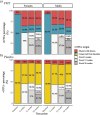Fecal microbiota transplantation alters gut phage communities in a clinical trial for obesity
- PMID: 38970126
- PMCID: PMC11227244
- DOI: 10.1186/s40168-024-01833-w
Fecal microbiota transplantation alters gut phage communities in a clinical trial for obesity
Abstract
Background: Fecal microbiota transplantation (FMT) is a therapeutic intervention used to treat diseases associated with the gut microbiome. In the human gut microbiome, phages have been implicated in influencing human health, with successful engraftment of donor phages correlated with FMT treatment efficacy. The impact that gastrointestinal phages exert on human health has primarily been connected to their ability to modulate the bacterial communities in the gut. Nonetheless, how FMT affects recipients' phage populations, and in turn, how this influences the gut environment, is not yet fully understood. In this study, we investigated the effects of FMT on the phageome composition of participants within the Gut Bugs Trial (GBT), a double-blind, randomized, placebo-controlled trial that investigated the efficacy of FMT in treating obesity and comorbidities in adolescents. Stool samples collected from donors at the time of treatment and recipients at four time points (i.e., baseline and 6 weeks, 12 weeks, and 26 weeks post-intervention), underwent shotgun metagenomic sequencing. Phage sequences were identified and characterized in silico to examine evidence of phage engraftment and to assess the extent of FMT-induced alterations in the recipients' phageome composition.
Results: Donor phages engrafted stably in recipients following FMT, composing a significant proportion of their phageome for the entire course of the study (33.8 ± 1.2% in females and 33.9 ± 3.7% in males). Phage engraftment varied between donors and donor engraftment efficacy was positively correlated with their phageome alpha diversity. FMT caused a shift in recipients' phageome toward the donors' composition and increased phageome alpha diversity and variability over time.
Conclusions: FMT significantly altered recipients' phage and, overall, microbial populations. The increase in microbial diversity and variability is consistent with a shift in microbial population dynamics. This proposes that phages play a critical role in modulating the gut environment and suggests novel approaches to understanding the efficacy of FMT in altering the recipient's microbiome.
Trial registration: The Gut Bugs Trial was registered with the Australian New Zealand Clinical Trials Registry (ACTR N12615001351505). Trial protocol: the trial protocol is available at https://bmjopen.bmj.com/content/9/4/e026174 . Video Abstract.
Keywords: Donor microbiome diversity; Fecal microbiota transplantation (FMT); Microbial engraftment; Microbial population dynamics; Phageome composition.
© 2024. The Author(s).
Conflict of interest statement
The authors declare no competing interests.
Figures






References
-
- Mocanu V, Zhang Z, Deehan EC, Kao DH, Hotte N, Karmali S, et al. Fecal microbial transplantation and fiber supplementation in patients with severe obesity and metabolic syndrome: a randomized double-blind, placebo-controlled phase 2 trial. Nat Med. 2021;27:1272–1279. doi: 10.1038/s41591-021-01399-2. - DOI - PubMed
Publication types
MeSH terms
LinkOut - more resources
Full Text Sources
Medical

